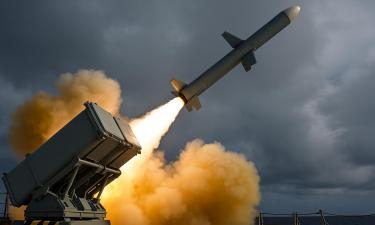Israel: Another Headache for Washington?
The White House hardly likes the idea of losing thousands of US soldiers in Palestine
The heat up of the Palestine-Israeli conflict has once again cast doubt upon the prospects of peaceful settlement in the Middle East. While diplomats are thinking about how to keep the Road Map from failing, US senators have emerged on the scene. Some have come to the conclusion that it will be impossible to settle the conflict from the outside without armed intervention.
In an interview with CNN, Republican Richard Lugar, the chairman of the Senate's international affairs committee and one of the most influential politicians in the US said: "If we are serious about having a situation of stability, a very direct action, I think, is going to be required." He added that Washington should consider the possibility of sending US armed forces and military from other countries to the region. The opinion of Senator Lugar was supported by Democrat Dianne Feinstein who thinks that US armed intervention is required for the Middle East conflict. According to the senator, only a supervisory mission in the region is not enough; it is important to introduce armed forces there to curb terrorism.
Richard Lugar says if a probable military operation is to take place in the Middle East, the forces of US and its NATO allies must be involved into it. This is quite understandable why the senator is supporting this idea. The US army has got stuck in Iraq. Deployment of additional military contingents in Iraq is being actively discussed now. These may be extra 40-60 thousand soldiers in addition to the 140,000 servicemen currently in Iraq. Sending American and NATO troops to settle this conflict would not be easy. The White House hardly likes the idea of losing thousands of US soldiers in Palestine.
However, these are just mere suggestions so far. America remembers perfectly well that US marines have already participated in peacemaking operations in the Middle East, not in Palestine but in Lebanon. By the way, this participation was not a success. In 1983, a kamikaze from the Hezbollah Islamic resistance movement blew up the quarters of US marines in Beirut. 241 people were killed in the incident; after that US marines left Lebanon. What is more, at that very period the headquarters of French peacekeepers was blown up as well, 56 people were killed. So, US's allies in NATO will hardly like the idea of sending their troops to Palestine.
It is important that Israel is strongly objecting to participation of peacekeepers in settlement of the conflict in the region. In 2000, Palestinians asked the UN Security Council to deploy peacekeepers on the West Bank and in Gaza Strip. But Israel was against fulfillment of the request. The Israeli leadership believed that presence of peacekeepers would hamper fighting against terrorist organizations. It is unlikely that the government of Ariel Sharon will change it point of view regarding this question. Especially that now the fate of the Palestinian government is not clear. Tt is an open secret that Prime Minister Mahmoud Abbas and Palestinian Authority Leader Yasser Arafat are constantly in conflict. The situation in the Palestinian leadership seems to be rather obvious: one of them will have to leave. But the problem is that if Arafat or Abbas on his own free will agrees to quit the position, this won't put an end to the conflict all the same. Neither Israel nor the US wants to deal with Arafat. Mahmoud Abbas has taken the place of Arafat as the key negotiations partner; unfortunately he cannot curb terrorist organizations. Then it is quite obvious that no matter who is quitting the political scene in the Palestinian Authority, this won't bring peace to the Middle East.
Meanwhile, it now seems that Washington seriously doubts that Israel and Palestine can do with their own resources to settle the conflict peacefully. Otherwise it wouldn't touch upon the idea of sending peacemakers to the region. It may be so that armed intrusion will have some effect. But to tell the truth, so far the experience of the USA and NATO has been rather unconvincing in this respect.
Subscribe to Pravda.Ru Telegram channel, Facebook, RSS!





